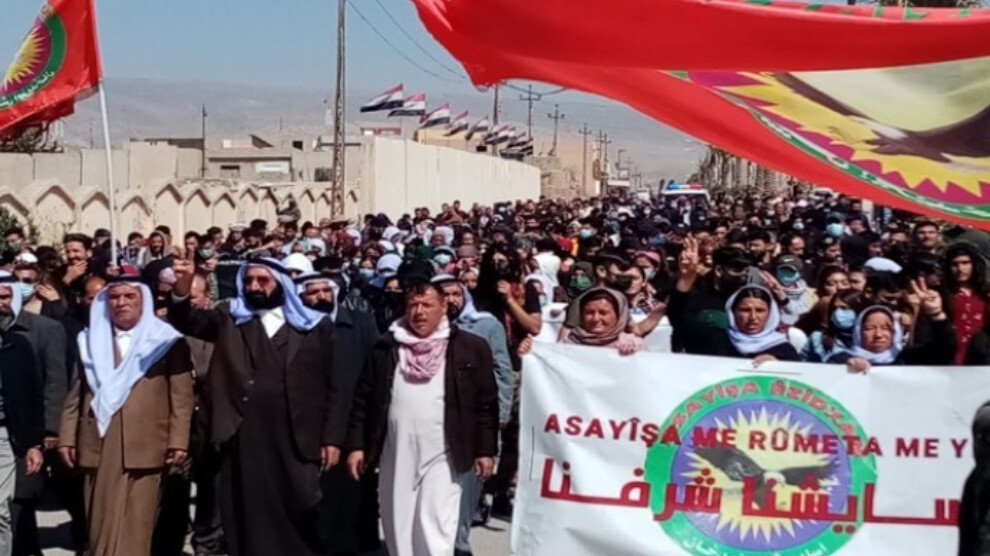KNK: Hands off Shengal!
KNK called upon the United Nations, the European Union, the United States, and world human rights organisations to work to protect the Yazidis from future massacres.
KNK called upon the United Nations, the European Union, the United States, and world human rights organisations to work to protect the Yazidis from future massacres.

The Executive Council of the Kurdistan National Congress (KNK) released a statement on the latest developments in the region of Shengal (Sinjar) in southern Kurdistan, northern Iraq.
The statement includes the following:
“The Yazidi (Êzîdî) people of Sinjar (Şengal) have been persecuted for centuries. The most recent genocide of the Yazidis began in August 2014, when the so-called Islamic State (ISIS) terrorist group invaded Sinjar and surrounding areas, killing, kidnapping, and enslaving thousands of Yazidis and displacing hundreds of thousands. The genocide of the Yazidis, one of the most infamous crimes against humanity perpetrated by ISIS, was invoked as a major motivation for international military intervention against the terrorist group, an effort that ultimately led to the defeat of ISIS as a territory-holding entity in the region. However, years later, thousands of kidnapped Yazidis are still missing and Sinjar struggles to rebuild.
The recent genocide of the Yazidis occurred after the security forces of the Iraqi federal (central) government and the Kurdistan Democratic Party (KDP) peshmerga failed to defend Sinjar, choosing to abandon the area as ISIS approached. In response to the massacre that followed the invasion by ISIS, the peoples of Sinjar, including the Yazidis, formed their own autonomous administration and security forces to protect against future aggression. Now the government of Iraq and the KDP are demanding that local security forces, the Ezidxan Asayish, leave Sinjar, although the Ezidxan Asayish were previously recognized by the Iraqi federal authorities. This development follows the 9 October 2020 “Sinjar Agreement” by the Iraqi government and the KDP under the coordination of United Nations representatives and with the support of Turkey and the United States. The “Sinjar Agreement” was signed by the Iraqi government and KDP without any consultation with the Yazidis. Since the announcement of this agreement, Sinjar has seen popular protests rejecting its terms and showing solidarity with the Ezidxan Asayish.
Instability in Syria and the rise of ISIS focused global attention not only on the atrocities committed by ISIS against the Yazidis, but also on the strategic location of Sinjar, which is west of the city of Mosul and not far from Iraq’s border with Syria. The Turkish state, which openly pursues a campaign of military expansionism and occupation in Iraq, Syria, and elsewhere, sees Sinjar as essential to the strategy of expanding its zones of occupation in the region and regaining control of the entirety of the former Ottoman province (vilayet) of Mosul, which comprised many provinces of present-day Iraq.
Both Baghdad and the KDP polished their images on the world stage after hosting Pope Francis and are now using this enhanced global status to expand their power, and the recent developments in Sinjar are an important component of this campaign. The Turkish state suffered a major defeat earlier this year after a four-day military offensive against PKK guerrillas in Garê, South Kurdistan (northern Iraq), and now plans to use this opportunity to expand.
The Sinjar/Shengal Democratic Autonomous Council (Meclîsa Xweseriya Demokratîk a Şengalê, MXDŞ) has called for solutions to the region’s issues in accordance with the will of the peoples of Sinjar and stated, “We emphasize once again that we do not want war, but peace,” and also drew attention to the ongoing marginalisation of their people.
The Kurdistan National Congress (KNK) supports the demands and proposals of the MXDŞ and echoes their call for a peace in Sinjar, and we call for the Iraqi government and the KDP to respect and recognize the will of the Yazidis and all of the peoples of Sinjar and assist them with rebuilding their society and ensuring their own security rather than persecuting them as they struggle to recover from the most recent genocide.
We also call upon the United Nations, the European Union, the United States, and world human rights organisations to work to protect the Yazidis from future massacres, assist with the reconstruction of Sinjar, and reject political and military steps taken in Sinjar that are contrary to the will of the peoples of the region.”